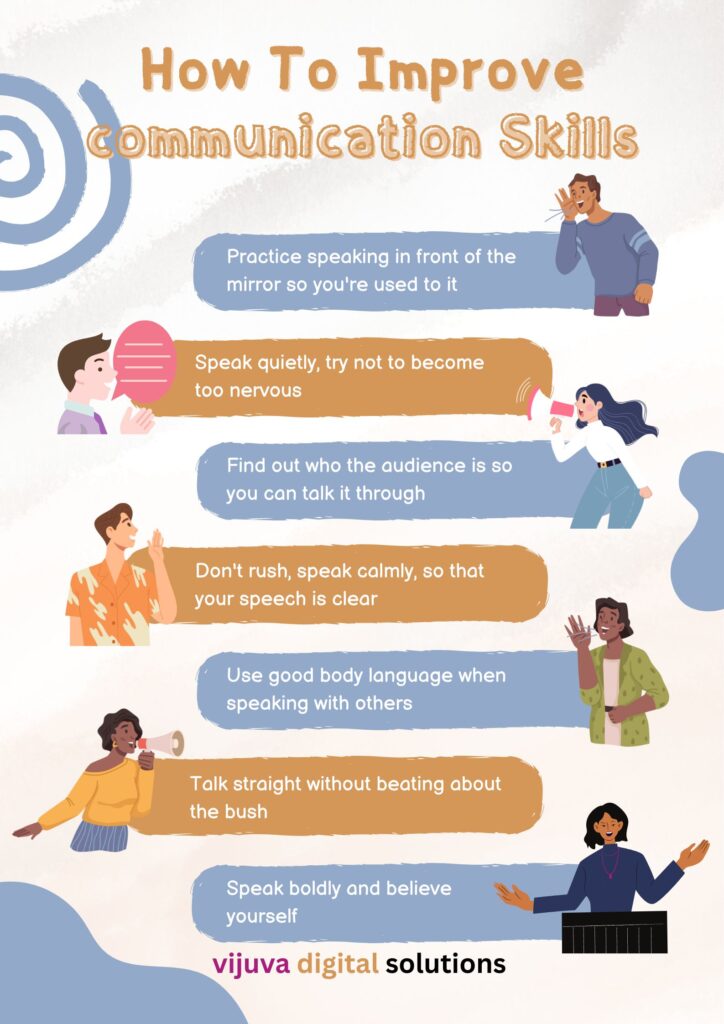How to improve communication skills, career growth, our relationships, career success, and daily interactions. Good communication skills—verbal clarity, active listening, public speaking, writing, and nonverbal cues—help us connect, influence, and lead. Whether you want to speak confidently in public or improve your listening in conversations, every skill counts.

Why Communication Skills Matter
✅ Drive career growth and opportunities
✅ Build stronger personal and professional relationships
✅ Enhance leadership and collaboration
✅ Reduce misunderstandings and resolve conflicts
✅ Boost confidence and self-expression
Core Elements of Effective Communication
To truly master how to improve communication skills, it’s important to focus on these essential elements that form the foundation of powerful, impactful communication.
- Verbal Communication: Focus on clarity of speech, appropriate tone, and speaking pace to ensure your message is easily understood.
- Active Listening: Fully concentrate on what others are saying, reflect back, and respond thoughtfully. It builds trust and eliminates misunderstandings.
- Non‑Verbal Communication: Use eye contact, posture, and facial expressions to support your message and demonstrate presence and confidence.
- Writing Skills: Improve how you organize and present ideas in emails, blogs, or messages. Keep content structured, clear, and purposeful.
- Public Speaking: Learn how to prepare, structure, and deliver effective speeches with regular practice and feedback to enhance stage confidence.
Whether you’re improving interpersonal communication at work or sharpening your presentation skills, these core components will help you consistently grow in how to improve communication skills.
Proven Tips on How to Improve Communication Skills
Mastering how to improve communication skills is essential for building relationships, advancing your career, and increasing your confidence. Here are practical tips to help you grow:
- Develop Active Listening
Focus fully, paraphrase responses, and ask open-ended questions. Avoid interruptions and show genuine empathy. - Simplify Your Language
Avoid jargon and use clear, simple, and precise expressions for better clarity and connection. - Mind Your Pace & Pauses
Speak at 120–150 words per minute. Use intentional pauses to emphasize key points. - Expand Your Vocabulary
Read regularly and learn LSI terms like “interpersonal communication,” “nonverbal cues,” and “public speaking techniques.” - Join Public Speaking Groups
Practice regularly with clubs like Toastmasters International to enhance stage presence and speech delivery. - Practice in Front of a Mirror
Observe and improve your posture, hand gestures, and facial expressions. - Record & Review Yourself
Analyze your speaking patterns, tone, and fillers (e.g., “um,” “like”) to improve clarity. - Prepare Before You Speak
Organize your key points and goals to bring clarity to speeches, meetings, and emails. - Enhance Non‑Verbal Signals
Make strong eye contact (3-second rule), use open body language, and maintain a confident posture. - Seek Constructive Feedback
Ask peers or mentors to assess your communication and suggest improvements. - Use Storytelling
Add real-life examples or stories to make your message memorable and personal. - Work on Writing Skills
Write blogs or journal entries to practice expressing thoughts in a structured and impactful way. - Be Empathetic
Understand and respond to others’ emotions and perspectives with sensitivity. - Engage in Daily Drills
Practice speaking aloud, record yourself, and do listening exercises to build confidence. - Be Consistent
Focus on small, daily habits. Consistency is key in mastering how to improve communication skills.

Daily Practice Exercises on How to Improve Communication Skills
If you’re wondering how to improve communication skills effectively, try incorporating these simple daily exercises. Practicing a little every day builds confidence, clarity, and connection.
- Word of the Day: Learn and use a new communication-related word like “empathic,” “articulate,” or “concise.”
- Mirror Talks: Practice 5-minute speeches in front of a mirror on everyday topics like your routine, goals, or opinions.
- Storytelling Session: Share a personal experience with a friend or family member to improve narrative clarity and flow.
- Active Listening Drill: In a conversation, focus fully and then summarize the other person’s point to reinforce listening skills.
- Mini Presentations: Give short, impromptu 3-minute talks to peers or family members to build quick-thinking and articulation.
FAQs on How to Improve Communication Skills
Q: How fast can I improve?
A: With consistent effort and daily communication drills, noticeable progress can appear in 1–3 months. Mastery takes time, but growth begins immediately.
Q: Can introverts excel here?
A: Absolutely. Introverts often excel in structured practice, thoughtful expression, and active listening—all essential for those learning how to improve communication skills.
Q: What’s the most impactful habit?
A: The most powerful habit is combining mirror practice with group speaking drills. These help enhance vocal clarity, nonverbal cues, and confidence.
Conclusion: How to Improve Communication Skills Effectively
Learning how to improve communication skills is a lifelong journey that requires intention, practice, and self-awareness. By consistently developing key areas, you can boost your confidence and impact in every conversation.
- Active Listening – the foundation of meaningful dialogue and connection
- Clear Verbal & Written Communication – express your thoughts with clarity and confidence
- Public Speaking – sharpen presentation and storytelling techniques
- Non-Verbal Cues—Improve body language, facial expressions, and eye contact
- Lasting Daily Practice – build habits through small, consistent communication drills
Whether you’re improving your interpersonal communication, mastering public speaking techniques, or strengthening nonverbal communication, the key is consistent growth.
Remember: Communication is a journey, not a destination. Start today—and see how it transforms your confidence, relationships, and career.
